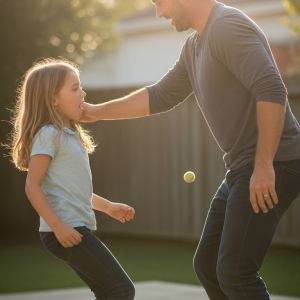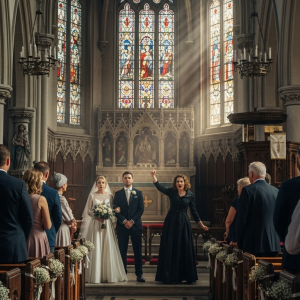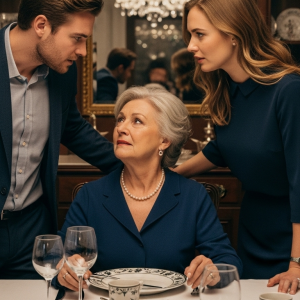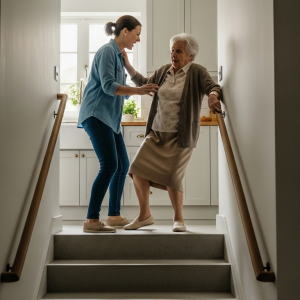Her name, they told her, was Jane. It was a name that felt like a borrowed coat—it fit well enough, but it held no warmth, no scent of familiarity. Her life was a collection of quiet, orderly days in a small, sterile apartment that held no photographs, no mementos, no history. It was a life curated by others, for a person she didn’t feel she was.
Her only regular visitors were her cousins, Mark and his wife, Brenda. They were relentlessly kind, their concern a constant, suffocating blanket. They brought her groceries, managed her finances, and spoke of her past in vague, gentle terms. There had been a car accident, they explained. A bad one. She was lucky to be alive, but her memories… well, they were a casualty of the trauma.
“The doctors said it’s best not to push it, Jane,” Brenda would say, her smile perfectly sympathetic. “Just focus on the now. We’re here to take care of everything. You don’t need to worry about a thing.” Mark would nod in agreement, his handsome face a mask of earnest concern. They were her lifeline, her only connection to a past she couldn’t access.
But the past visited her in other ways. It came in the dead of night, in fractured, terrifying nightmares. She would dream of falling, a stomach-lurching tumble through darkness, the sight of a dark, ornate wooden staircase rushing up to meet her. Sometimes, she would see a face, twisted in a snarl of pure rage, a face that felt horrifyingly familiar but remained just beyond recognition.
These nocturnal terrors left a residue on her waking life. She had an inexplicable, visceral fear of steep staircases, her hand always gripping the railing, her heart pounding in her chest. She couldn’t explain it, and Mark and Brenda would dismiss it with pitying looks. “It’s just the trauma, Jane. Your mind is playing tricks on you.”
Her life as Jane was a placid, shallow pond. She felt that just beneath the surface, there was a deep, dark ocean of who she used to be, but she had no memory of how to swim. She was a ghost haunting her own life, and the emptiness was becoming unbearable.
The road trip was an act of quiet desperation. After another week of polite, empty conversations with her cousins, Jane felt a primal need to escape, to break the pattern. She packed a small bag, left a note on her kitchen counter, and just started driving, with no destination in mind.
She drove for days, letting the highways of middle America unspool before her. She was searching for a sign, a landmark, a flicker of recognition in the face of a stranger—anything to prove she had existed before the accident. She found nothing but a deeper sense of her own dislocation.
On the third day, she pulled off the highway, drawn by a sign for a local farmer’s market. It was a vibrant, chaotic scene, a burst of life that was a stark contrast to her own sterile existence. The air smelled of fresh peaches and hay. People laughed and chatted. For a moment, she felt a pang of something other than emptiness.
She wandered through the stalls, an anonymous observer. Near a truck selling homemade jams, a large, old Golden Retriever was sleeping in a patch of shade. He was a handsome old dog, his muzzle gone to gray, his tail twitching in a dream.
As Jane walked past, a gentle breeze carried her scent toward him. The dog’s nap ended with an abruptness that was startling. His head shot up, his ears perked, and his old, cloudy eyes fixed on her. A low whine started deep in his chest, and then, with a strength that belied his age, he scrambled to his feet.
He let out a series of frantic, joyous barks and, ignoring his owner’s surprised shouts, bolted directly toward her. He didn’t jump or act aggressively. He barreled into her legs, pressing his face into her hands, his entire body wracked with the pure, unadulterated ecstasy of a long-awaited reunion.
“Buddy! Get back here!” a man’s voice called out from the truck.
The name hit Jane’s mind like a stone thrown into a still pond. Buddy. The sound of it, the shape of it on her tongue, it was… right. She instinctively dropped to her knees, her hands burying themselves in the dog’s thick, soft fur. The scent of him—a familiar, comforting smell of sunshine and clean earth—filled her senses. And then, the first crack appeared in the wall of her amnesia.
The first memory was a flash of brilliant color. A red ball soaring through a sun-drenched green lawn, a much younger, more energetic Buddy leaping to catch it. A house—a beautiful, sprawling house by a shimmering blue lake. A swing set. Laughter. Her laughter.
“I’m sorry, ma’am! He’s usually so calm,” the dog’s owner said, rushing over. “I’ve never seen him act like this.”
But Jane wasn’t listening. Her head was filled with a roaring sound. She clutched Buddy’s fur, the dog now whining softly, licking the tears that had begun to stream down her face. Another image slammed into her consciousness: a man’s face, kind and weathered, with laugh lines around his eyes. Dad. The word was a silent explosion in her mind.
The idyllic memories of the lake house and her father gave way to something darker, more chaotic. The images began to flicker and warp, like a corrupted video file.
The grand, dark wood of an indoor staircase. The intricate pattern of an oriental runner on the floor. The sound of shouting voices, angry and sharp. A heavy, official-looking document on a table.
She gasped, her head pounding. The world around her—the farmer’s market, the concerned face of the dog’s owner—faded to a dull, distant hum. She was trapped in the storm breaking inside her own mind.
The final fragment of the sequence crashed through. The angry, contorted face from her nightmares. It was clear now, no longer a blur. It was Mark. Her cousin. No, not her cousin. Her… her brother. And he was screaming at her, his face inches from hers.
The psychic pain was overwhelming. She let out a cry, curling into a ball on the dusty ground, her arms wrapped around her head as if to physically stop the memories from tearing her apart. The puzzle pieces of her forgotten life were reassembling themselves, not into a gentle picture of the past, but into a mosaic of horror. She wasn’t Jane. And she hadn’t been in a car accident.
The dog’s owner, a kind farmer named Mr. Gable, helped her to her feet, his face etched with worry. “Are you alright, miss? Should I call a doctor?”
She shook her head, her mind still reeling. But amidst the chaos, one thing was now anchored in perfect, terrible clarity. The dog. Buddy. He was real. He was hers. “Where did you get him?” she asked, her voice a raw whisper.
“He wandered onto my property about three years back,” the farmer explained. “No tags, no chip. Came from the direction of the old Davenport place by the lake. Figured he was abandoned.”
The Davenport place. Her father’s name. Her name. The final memory, the one her brain had locked away to protect her, broke through with the force of a tidal wave.
She remembered everything.
Her name was Anna Davenport. She remembered her father, just weeks before his death, calling her into his study. He had looked at her with a sad, weary pride. He told her that he was leaving the company, the house, the entire Davenport fortune, to her. Not because he didn’t love Mark, but because he knew his son was weak, easily manipulated, and lacked the strength to be a steward of their legacy.
She remembered the terrible confrontation after the will was read. Mark and Brenda, their faces masks of disbelief and fury. Mark had accused her of manipulating their dying father. He had demanded she renounce the will and split everything equally. She had refused, standing her ground at the top of the grand staircase.
She remembered his final words, his voice thick with venom: “If you won’t give it to me, you won’t have it either.” She remembered the feel of his hands shoving her, hard, in the center of her chest. And she remembered the terrifying, weightless sensation of falling backward into darkness.
She had not been in a car accident. She had been left for dead by her own brother.
The lost, confused woman named Jane vanished. In her place stood Anna Davenport, reborn in a fire of remembered betrayal. She wrapped her arms around Buddy, the loyal, living link to her stolen life, and whispered into his soft fur.
“Buddy, I remember. I remember everything.” Her face, moments before a canvas of pain and confusion, settled into a mask of cold, diamond-hard resolve. She looked up at the farmer. “Sir, I believe you have my dog. And I need to make a phone call.”
Anna did not return to the sterile apartment that had been her prison. Her first call was to her father’s old lawyer, whose name had returned to her with perfect clarity. Her second was to the sheriff’s department of that very county. With the farmer and a bewildered but loyal Buddy by her side, she spent the next three hours giving a detailed statement.
Two days later, Mark and Brenda received a call from the Davenport family lawyer. His tone was urgent. “There has been a significant development regarding the estate,” he said, his voice clipped and formal. “I require your presence for an emergency meeting at my office tomorrow at 10 a.m. Do not be late.”
They arrived at the lawyer’s office feeling smug and confident. They assumed “Jane” had suffered some sort of breakdown on her little road trip and that this meeting was about getting her institutionalized, a step that would make their complete control over the estate permanent.
They were led into the main conference room. And their world ended.
Sitting at the far end of the long mahogany table was not the lost, pliable “Jane” they had so carefully managed. It was Anna. Her hair was pulled back, her eyes were clear and cold, and a quiet, unshakeable authority radiated from her. Sitting beside her were two uniformed police detectives. And lying at her feet, his head resting on her shoes, was a calm and watchful Golden Retriever.
Brenda gasped, her hand flying to her mouth. Mark froze, his face instantly draining of all color. The elaborate, three-year-long play was over. The star of the show had remembered her lines.
“Hello, Mark. Brenda,” Anna said, her voice as level and sharp as a surgeon’s scalpel. “It’s been a while.”
The destruction was swift and merciless. The lawyer laid out the legal case: the fraudulent management of her assets, the embezzlement, the conspiracy. The detectives then took over, informing them they were the primary suspects in the assault and attempted murder of Anna Davenport three years prior.
Mark’s face crumbled. The arrogant, controlling man dissolved into a stammering, terrified boy. “Anna… I… it was an accident! I was angry, I just pushed you, I never meant for you to get hurt that badly!” It was a full confession, blurted out in a torrent of panicked self-preservation.
Brenda, ever the pragmatist, remained silent, her mind already calculating plea bargains. But there was no escape. Their careful, cruel conspiracy had been unraveled by the simple, unwavering loyalty of a very good dog.
Anna Davenport reclaimed her life with the same quiet determination that had brought her back from the brink. The legal battle was long and ugly, but the outcome was never in doubt. Mark and Brenda were convicted, their sentences a public testament to their greed and cruelty.
Anna took back control of her company, her home, her fortune. But she didn’t just step back into her old life. The trauma had changed her, forged her into someone stronger, more discerning. The empty, quiet woman named Jane was gone, but the trusting, slightly naive Anna from before the fall was gone, too.
She didn’t immediately move back into the grand house by the lake. The memories were still too sharp, the ghosts too present. Instead, she spent a year traveling, with Buddy always by her side. She reconnected with old friends, rebuilding the bridges her brother had burned. She was not just healing; she was rediscovering herself.
The final scene took place a year later, on a crisp autumn afternoon. Anna and Buddy were walking along the shore of the lake, the fallen leaves crunching underfoot. They were finally home. The house no longer felt like a crime scene or a place of ghosts. The sun glinted off the water, and the air was clean and cold.
She had faced the worst betrayal imaginable and had not only survived, but triumphed. The plot to erase her had failed. In their attempt to make her disappear, her family had inadvertently given her the opportunity to be reborn, stronger and more self-aware than ever before.
She threw a stick into the water. Buddy, his old joints momentarily forgotten, plunged in after it with a joyful bark. As she watched her loyal, steadfast friend, the one who had never forgotten, a genuine, peaceful smile touched her lips. She was home. And she was finally ready to begin again.




